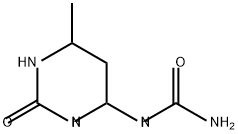Production Methods
6-methyl-2-oxoperhydropyrimidin-4-ylurea, is obtained either by condensation of urea with crotonaldehyde in the presence of acid or by the more straightforward route involving condensation of urea with acetaldehyde in the molar ratio 1 : 1 in the presence of acid, which is used in industry. 2,7-Dioxo-4,5-dimethyldecahydropyrimido[4,5-d]pyrimidine is formed as a byproduct in the second route.
2-Oxo-4-ureido-6-methylhexahydropyrimidine is produced industrially by a continuous process employing a stirred tank cascade. A 70% urea solution is treated with acetaldehyde at a molar ratio of 1 : 1 in the presence of a catalytic amount of 75% sulfuric acid. The exothermic reaction is kept between 38 and 60 ℃ by controlled cooling. The pH is initially kept above 3 and in the final reactors below 2 by addition of sulfuric acid. Average residence time in the cascade is 40 min. In the last stirred tank, the reaction mixture is neutralized with aqueous potassium hydroxide solution. Drying is carried out in a spray tower.
